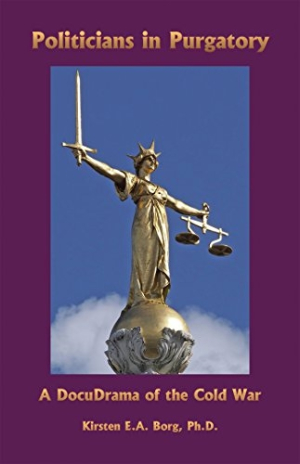Politicians in Purgatory
A Docudrama of the Cold War
The fantastical drama Politicians in Purgatory sets the Cold War’s most prominent instigators and participants into conversation with each other.
Cold War-era politicians face judgment in Kirsten E. A. Borg’s fantasy novel Politicians in Purgatory.
In purgatory, there is a court presided over by a justice whose job it is to decide what to do with each soul who enters her domain. Standing before her, the story’s defendants are five famous politicians: Winston Churchill, Nikita Khrushchev, Charles de Gaulle, Jawaharlal Nehru, and Lyndon B. Johnson. Each played a crucial role in the Cold War, and each is asked to answer for their actions. The justice gives each man a chance to explain and defend his decisions before they are sentenced to heaven or hell.
The narrative takes the form of a multimedia stage play that includes video footage and musical numbers. The courtroom setting sometimes shifts to imitate important historical locations—and to give the politicians room to posture. Each of the defendants reviews his life’s work with help from the devil’s advocate and a guardian angel, both of whom seek to highlight their negative and positive qualities. These secondary characters facilitate the story, though the spotlight remains focused on the politicians themselves.
The personalities of the men dominate the proceedings; they are as standout in death as they were in life. Pugnacious and proud, they bluster their way through the trial, not hesitating to pick fights with others. But their usual tactics do not work as well in purgatory as they did on Earth. Churchill is truculent, while Nehru distinguishes himself with his calm, introspective demeanor. They each express rage and sorrow over their respective nations’ suffering, but speak of their own sins in casual, even callous, tones. They deflect blame for Cold War disasters onto others, but show great compassion for those whom they view as their own people.
After eliciting each man’s personal visions of heaven and hell, the justice passes sentence on each defendant. While the fairness of her rulings is a matter of individual opinion, and includes some glossing over of historical missteps, her logic is clear: it draws on each man’s testimony, which was inspired by the men’s real-life memoirs. Throughout, there’s an authentic sense of their emotions, perspectives, and the excuses that they hide behind. The result is satisfying and thought-provoking, introducing the political and historical nuances of the Cold War well.
Politicians in Purgatory is innovative in its treatment of the Cold War, setting its most prominent instigators and participants into conversation with each other.
Reviewed by
Eileen Gonzalez
Disclosure: This article is not an endorsement, but a review. The publisher of this book provided free copies of the book and paid a small fee to have their book reviewed by a professional reviewer. Foreword Reviews and Clarion Reviews make no guarantee that the publisher will receive a positive review. Foreword Magazine, Inc. is disclosing this in accordance with the Federal Trade Commission’s 16 CFR, Part 255.

